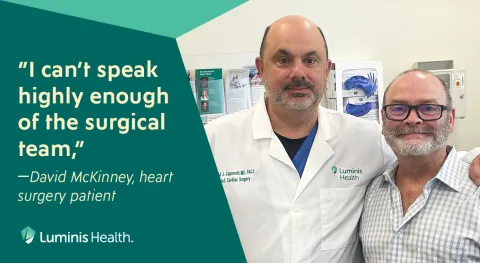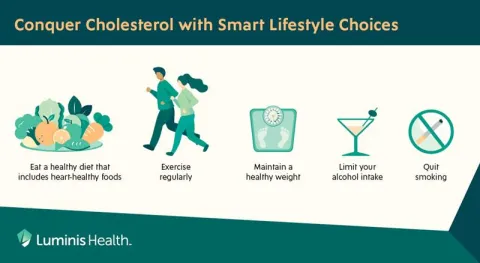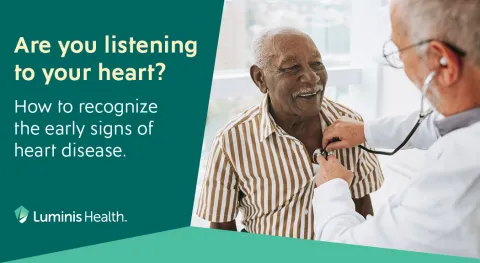Stars in your eyes, butterflies in your stomach, weak in the knees—falling in love is a feeling like no other. But did you know being in love actually has tangible health benefits for both your body and your mind?
“We are social creatures and we do best when we have strong social support systems,” explains Baran Kilical, MD, a cardiologist at Anne Arundel Medical Center. “Being in love can affect everything from your stress levels to your heart health.”
Here are few of the scientifically backed benefits of being in love:
A longer life
Research shows a clear link between strong social ties and longevity. A study published in the American Journal of Epidemiology assessed the relationships of nearly 5,000 adults ages 30 to 69. Those with strong, happy marriages lived longer than unmarried men and women.
Unfortunately, the phenomenon goes both ways. In the same study, adults with poor social ties had twice the risk of death compared to others in the study. “Many different studies have replicated these findings, especially in men,” says Dr. Kilical. “Most research shows being married is even more beneficial to men’s health than women’s health.”
And there’s a growing amount of research showing a higher risk of illness and death in people with low quantity and low quality of social relationships. “Social isolation is a major risk factor for death from a variety of causes in both genders,” says Dr. Kilical.
Learn your risk for heart disease with our free online heart health profiler at
askAAMC.org/HeartHealth and take the first step toward having a healthy heart for life.
A healthy heart
It’s fitting that the symbol for love is a heart, given all the heart health benefits of being in love. Married people experience half the risk of death from heart disease than that of unmarried or divorced men and women. “One theory explains this finding by citing improved function of the autonomic nervous system, which controls bodily functions like heart rate, in people who are married or in love,” says Dr. Kilical.
“Our sympathetic nervous system, or our stress “fight-or-flight” response likely plays a role as well.” Being in love tends to decrease our stress response, which can in turn lower blood pressure. Studies show strong love, marriage and social ties improve blood pressure, while isolation and being around strangers increases it. The same holds true for heart rate.
And if you do have a heart attack, being happily married helps. In a 2015 study, married people had a 14 percent lower risk of dying in the hospital after a heart attack. They also had shorter hospital stays by an average of two days.
Healthy lungs
It’s not just your heart that benefits from being in love. Being married can help protect against complications and death from pneumonia. Compared to unmarried men and women, married people are less likely to require ventilator support via a breathing machine, have shorter hospital stays, are less likely to end up in an intensive care unit and have 13 percent lower risk of dying during hospitalization for pneumonia.
Less stress
Besides the physical health benefits, being in love works wonders for your mental health as well. Love, marriage and overall wellbeing reduce stress, which also strengthens your immune system.
But what really goes on in your mind when you’re in love? “Thanks to endocrine research (the study of hormones) and modern functional brain MRIs, we can get a peek behind the scenes,” says Dr. Kilical. “Love causes changes in many of your hormones including oxytocin, vasopressin, dopamine, serotonin, cortisol and testosterone.” Here’s some of what goes on in your brain:
- The hormones oxytocin and vasopressin interact with your dopamine reward system. This is the same system that causes people to feel good or happy when positive events happen, such as getting a pay raise or falling in love.
- Vasopressin helps control blood pressure.
- Cortisol, the stress hormone, initially rises when you fall in love, but quickly drops in a long-term, stable relationship. Low cortisol levels sustained in a long-term stable relationship contributes to many health benefits.
Not in love? How to still reap the benefits
If a significant other is lacking in your life, no need to worry. “Some of these health benefits still apply to people who have a strong social support system,” notes Dr. Kilical. “Positive, close relationships with family members and friends can keep you healthier, too.”
Even something as simple as a hug can help. Most people know hugs can help you feel connected to other people, but did you know they can actually help prevent sickness? When you feel connected to others, especially through physical touch, you’re less prone to experience sickness caused by stress.
In one study of more than 400 adults, researchers found that the more often people hugged, the more their chances of getting sick decreased. Hugging may be an indicator of overall social support in a person’s life, which also promotes good health. In the same study, the adults who said they have a strong social support system had fewer cold symptoms than those who said their support system was lacking.
No matter what your relationship status, remember that positive, close relationships are important for your overall health and wellness. Taking the time to invest in family members and friends is also an investment in your personal health.
Author
 Baran Kilical, MD, is a cardiologist and cardiac electrophysiologist with Anne Arundel Medical Center.
Baran Kilical, MD, is a cardiologist and cardiac electrophysiologist with Anne Arundel Medical Center.
Originally published Feb. 13, 2017. Last updated Feb. 7, 2020.





